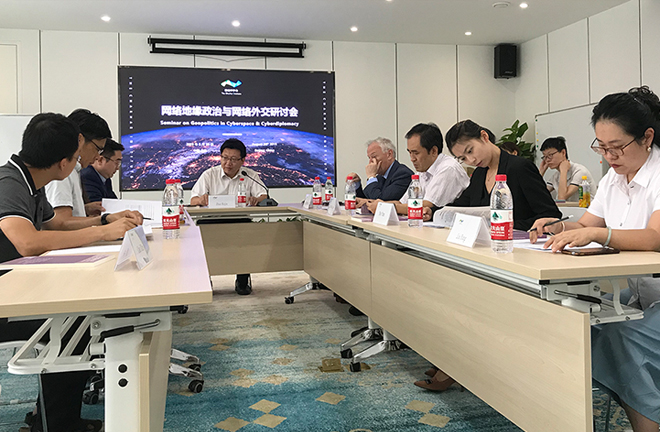International community needs to cooperate in internet governnance

At the seminar on Aug. 26, scholars analyzed the current status of cyber security and possible ways to govern networks. Photo: Chu Guofei/CSST
Since 2019, hot topics in world news including the telecommunication giant Huawei, the implementation of 5G technology, and cyber security have attracted people’s attention, implying that stakeholders in international relations are experiencing escalating conflicts in the network environment. The network was once regarded as an interconnected space without borders and sovereignty. However, in recent years, countries have begun to seek sovereignty in cyberspace. Network diplomacy has increasingly become an important form of public diplomacy, and internet governance has become a hot topic.
At the “Seminar on Geopolitics in Cyberspace and Cyber Diplomacy” held by the Chahar Institute on Aug. 26, scholars from China and the United States analyzed the current status of cyber security and possible ways to govern networks from a geopolitical perspective.
Zhao Kejin, deputy dean of the School of Social Sciences at Tsinghua University, said that due to the anonymity of cyberspace, international relations may face common threats from anonymous third parties, so it is necessary for governments to cooperate in cyberspace.
Shaun Riordan, a senior visiting fellow at the Netherlands Institute of International Relations, said that people usually see cyberspace governance as the responsibility of technicians, but this shouldn’t be the case. Internet governance is actually a geopolitical issue. We can use knowledge from classical geopolitics and critical geopolitics to analyze the behaviors of states and non-state actors in cyberspace from the three perspectives of geopolitical fields, cultures and conditions.
The internet is much weaker than we think. Some network nodes are connected with many other nodes, and they form a large network distribution center. Several large distribution centers can control a large number of nodes. The United States controls the critical resources and infrastructure of the global internet, which gives the United States undue advantages in monitoring global network operations. The international community should work together to seek ways to govern the internet environment, Riordan added.
Riordan continued that cyberspace is highly uncertain and unstable, but currently there isn’t a universal international law to restrict behavior in cyberspace. Geopolitical theories can be adopted to understand the behavioral motives of various countries and non-state actors and predict their next moves. At the same time, we should establish codes of conduct and build an international community in cyberspace based on potential common interests.
Zhao Ruiqi, deputy dean of the School of Marxism at the Communication University of China and a research fellow from the Chahar Institute, said that there are three research hotspots in the study of the internet in China: artificial intelligence in network security, China’s network governance and China’s attitude towards international cyberspace. There are differences in cyber geopolitical culture between China and the United States, and at the same time, China and Europe enjoy a broad scope of cooperation to build network norms and cope with cyber hegemony.
Zhao added that in recent years, the United States has attached great importance to network diplomacy and it has reimagined social network sites as a new diplomatic means to serve the country. As a result, technology giants and social media platforms, such as Google, Twitter, Facebook and Apple, which are often regulated by the US government, have played disgraceful roles in the process of many third world elections that triggered protests and even turned into riots. As Western social media giants become tools of information warfare, non-Western countries must adopt targeted strategies and actions, otherwise they may find themselves in embarrassing situations where their country’s images are smeared, internal affairs are interfered with and the people are misled. As such, China should use accessible language for the targeted audience in external communication to enhance its international power of discourse, display an image of a responsible country and enhance overseas identity.
Zhao Xinli, associate dean of the School of Advertising at the Communication University of China, said that traditional media is generally considered as a kind of soft power, but the development of network media has changed this view. Some cyberspace acts with great military significance can be seen as a country’s hard power. China should seek common interests and develop cooperation with other countries in cyber security.
edited by YANG LANLAN

 PRINT
PRINT CLOSE
CLOSE